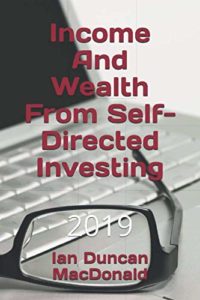By Ian Duncan MacDonald
Special to the Financial Independence Hub
If a financial guru, to sell his newsletters, predicts every month that we will soon have a full-blown recession, sooner or later he (or she) will be right. A recession is usually a six-month decline in economic activity. It is measured by a nation’s decline in Gross Domestic Production, coupled with monthly employment statistics. Since it must last six months, you are never quite sure if you are in one or not. Since the duration of the average recession is 9 months, it will most likely be over before Government departments can agree that we ever in a recession.
Recessions do not last forever. The longest recession was between August 1929 and March of 1933. This was the start of “The Great Depression” which, if you asked those who lived through it, believe it did not end until the beginning of the Second World War in 1939. It saw a Gross Domestic Product (GDP) decline of 26.7% compared to an average recession decline of 2.7%. Our last recession, between December 2007 and June 2009, was a contraction of 4.3%.
Normally the gap between recessions is 4 years 2 months. The current gap is almost eleven years. Employment is still high. Economic activity is not declining. Previously, the largest gap was between February 1961 and December 1969.
Cashing out in advance is a gamble
In a recession, investors see a large decline in the value of their shares. Can this decline in capital be avoided by selling your shares and reverting to cash until the recession is over? It can; however, you are never quite sure when you are in a recession and when you are out of it. Thus, liquidating a portfolio is a pure speculative gamble.
What is the solution? Strong, profitable companies that go into a recession generally survive. Weak, unprofitable companies, faced with shrinking markets and increased competition for reduced sales opportunities, often fail.
Companies that pay dividends are almost always profitable, established, strong businesses. During a recession they will continue to pay dividends. Their share price may decline by half, but the share price is not directly connected to the sales and the expenses that establish the operating margin from which dividends are paid. During the last recession some bank dividend percentages doubled when their share prices declined by almost 50%.
Speculators put bets on the cheap share prices of small, unprofitable companies that they think have the potential to eventually grow into large, profitable companies. When these share prices do soar, they sell the shares and take their reward. Recessions can wipe out speculators when the unprofitable companies they invest in are no longer able to generate sales or find investors to keep them operating.
The investors who win in a recession are those who carefully choose good dividend stocks. They intend to hold those shares forever. While waiting out the recession they live off their dividend income, while speculators must sell shares at their low recession prices to live on.
If they do not need the dividend income, they invest that it into their well-diversified portfolio at a time when their holdings are a bargain. In an emergency they always have the option of selling a few shares for quick cash. The only other time they consider selling any of their dividend shares is on those rare occasions when the dividend payments drop below an attractive level, or the profits of the company disappear. You too can profit from the next recession.
 After graduating from McMaster University, with $100 left in his pocket (but no student debt), Ian Duncan MacDonald hitch hiked home to Sudbury to work four months as a labourer in International Nickel’s smelter. In four months, he had saved enough to seek his fortune in the big city.
After graduating from McMaster University, with $100 left in his pocket (but no student debt), Ian Duncan MacDonald hitch hiked home to Sudbury to work four months as a labourer in International Nickel’s smelter. In four months, he had saved enough to seek his fortune in the big city.
In Toronto, he was immediately hired by Dun & Bradstreet as a credit reporter. While he had expected to be a reporter for the rest of his life, D&B had other plans. Within four years, he was General Manager of their Marketing Services Division. Three years later, at the age of 28, he was responsible for the sales, marketing and advertising for all three divisions of the company.
 At 32, he left D&B to build Screening Systems International Ltd, for a large conglomerate, which led to his interest in collections. Moving to Creditel of Canada Ltd. he became Senior Vice President. Subsequently bought by Equifax, he remained there until his retirement in 2005. In anticipation of his retirement he incorporated Informus
At 32, he left D&B to build Screening Systems International Ltd, for a large conglomerate, which led to his interest in collections. Moving to Creditel of Canada Ltd. he became Senior Vice President. Subsequently bought by Equifax, he remained there until his retirement in 2005. In anticipation of his retirement he incorporated Informus
Inc. to sell his art, his publications and consulting services (www.informus.ca.)
His book “Income and Wealth from Self-Directed Investing” provides a detailed system, plus stock scoring software, which arms someone who has never invested with the knowledge they need to successfully and safely generate income and wealth for the rest of
their lives.



